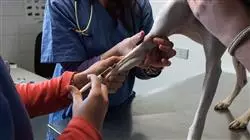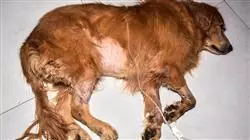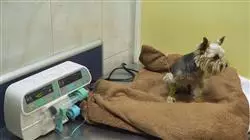University certificate
The world's largest faculty of veterinary medicine”
Description
Acquire the necessary skills to act as an expert in the area of Metabolic and Toxicological Emergencies in Small Animals, with the mastery of the latest techniques and advances in this intervention"

In emergency medicine there is a series of understandings, procedures and techniques which are common in the majority of cases, independent of the specialty or specialties involved in each case.
The most frequent metabolic emergencies in small animal medicine are decompensated diabetic patients and addisonian crises, the latter being underdiagnosed. In both cases, laboratory tests are fundamental in the diagnosis and control of the patient's evolution.
With regard to toxicological emergencies, a review is made of the most common emergencies in emergency departments, including pesticides, drugs for human and/or veterinary use, plants, insects and ophidian bites, among others.
In the patient with a toxicological emergency, a correct anamnesis is essential, as well as a diligent initial care based on the data obtained from the anamnesis and general examination, which may lead to the performance of gastric lavage or bathing or washing of the patient's body surface in order to reduce the absorption of the toxins involved while the clinician can stabilize the patient and perform the appropriate tests to determine the origin of the poisoning, the severity of the picture and the most appropriate treatment.
Thus, the care of a patient with metabolic and/or toxicological emergencies will be addressed: arrival at the emergency department, initial stabilization, as well as anamnesis, examination, complementary tests and medical treatment.
In short, we offer you a complete tour of all the areas of knowledge you need to provide quality emergency care.
Get a complete training in all aspects of intervention in Hematologic and Oncologic Emergencies through this highly effective training course"
This postgraduate certificate in Management of Metabolism and Toxicological Emergencies in Small Animals contains the most complete and up-to-date educational program on the market. The most important features include:
- Latest technology in online teaching software
- Highly visual teaching system, supported by graphic and schematic contents that are easy to assimilate and understand
- Practical cases presented by practising experts
- State-of-the-art interactive video systems
- Teaching supported by telepractice
- Continuous updating and recycling systems
- Self-regulating learning: full compatibility with other occupations
- Practical exercises for self-evaluation and learning verification
- Support groups and educational synergies: questions to the expert, debate and knowledge forums
- Communication with the teacher and individual reflection work
- Content that is accessible from any fixed or portable device with an Internet connection
- Supplementary documentation databases are permanently available, even after the course
Get a complete training in all aspects of intervention in Metabolic and Toxicological Emergencies through this highly effective training course"
Our teaching staff is made up of professionals from different fields related to this specialty. In this way, we ensure that we provide you with the training update we are aiming for. A multidisciplinary team of professionals trained and experienced in different environments, who will cover the theoretical knowledge in an efficient way, but, above all, will put the practical knowledge derived from their own experience at the service of the course: one of the differential qualities of this course.
This mastery of the subject matter is complemented by the effectiveness of the methodological design of this course. Developed by a multidisciplinary team of e-learning experts, it integrates the latest advances in educational technology. This way, you will be able to study with a range of comfortable and versatile multimedia tools that will give you the operability you need in your training.
The design of this program is based on Problem-Based Learning: an approach that conceives learning as a highly practical process. To achieve this remotely, we will use telepractice: with the help of an innovative interactive video system, and learning from an expert, you will be able to acquire the knowledge as if you were actually dealing with the scenario you are learning about. A concept that will allow you to integrate and fix learning in a more realistic and permanent way.
A high intensity course that will take you through different teaching approaches to allow you to learn in a dynamic and effective way"

Our innovative telepractice concept will provide you with faster integration and a much more realistic view of the content: “learning from an expert"
Objectives
This Course in Metabolism and Toxicology Emergencies in Small Animals compiles the most current knowledge based on the latest scientific research. Our ultimate goal is for the veterinary professional to deal with the emergencies that arise in this area, both in a center dedicated exclusively to emergency medicine and in a general practice where this service is available.

Our goal is simple: to provide you with the knowledge and skills necessary to increase your competence in veterinary Metabolism and Toxicology emergency care"
General Objectives
- Acquire knowledge and fundamental skills related to the initial attention of the patient and the necessary diagnostic and therapeutic procedures in the most common emergency situations.
Offer the most up-to-date treatments for a patient with metabolic and/or toxicologic problems, according to the latest research in the field
Specific Objectives
- Perform the correct triage of patients who arrive at the emergency department
- Assess, manage and provide primary care to patients in the emergency department
- Perform and interpret the routine tests in a metabolic and/or toxicology emergency consultation such as a rapid drug test or a glucose curve
- Perform a differential diagnosis based on the data from the physical examination, laboratory tests and diagnostic imaging tests
- Apply the most appropriate treatment and therapies in the treatment of patients with emergency metabolic and/or toxicology problems
- Perform precise medical-surgical techniques to stabilize patients with metabolic and toxicology emergency problems, such as gastric lavage or the use of devices for continuous glucose measurement

A path to achieve training and professional growth that will propel you towards a greater level of competitiveness in the employment market"
Postgraduate Certificate in Management of Metabolic and Toxicological Emergencies in Small Animals
The Postgraduate Certificate in Management of Metabolic and Toxicological Emergencies in Small Animals is a complete program designed to provide the veterinary medicine professional with the necessary tools and knowledge for the effective management of emergency situations in small animals. This Postgraduate Certificate addresses in detail the management of the most frequent metabolic emergencies, such as diabetic decompensation and Addisonian crises, and delves into the fundamental role of laboratory tests in the diagnosis and control of the patient's evolution.
Update your knowledge in toxicological emergencies
In addition, the most common toxicological emergencies in emergency services are reviewed, such as those related to pesticides, drugs for human and/or veterinary use, plants, insects and snake bites, among others. In these cases, the importance of a correct anamnesis and general examination is emphasized to carry out diligent initial care, with the aim of reducing the absorption of toxins and stabilizing the patient. The Postgraduate Certificate in Management of Metabolic and Toxicological Emergencies in Small Animals program is designed so that veterinary medicine professionals can improve their clinical practice and provide quality care to their patients in emergency situations. The contents are based on the latest scientific evidence and are taught by renowned professionals in the sector, which guarantees high-level training. If you are a veterinary medicine professional looking to improve your training in the management of metabolic and toxicological emergencies in small animals, the Postgraduate Certificate in Management of Metabolic and Toxicological Emergencies in Small Animals at our university is the ideal option for you.







